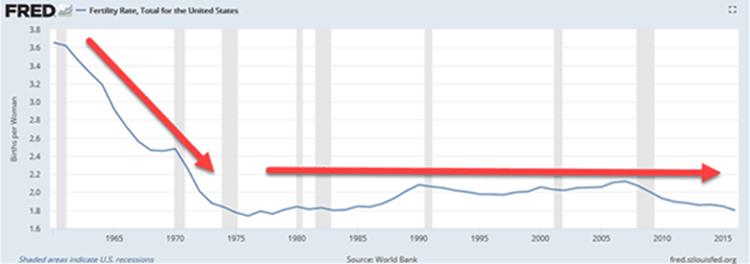Will Technology Save Baby Boomers?
Politics / Demographics Jan 03, 2019 - 04:36 PM GMTBy: Patrick_Watson

 Baby Boomers get blamed for all kinds of problems.
Baby Boomers get blamed for all kinds of problems.
Much of the blame is unfair. But there is no doubt the first postwar generation brought a lot of changes—culturally, economically, and otherwise.
Last month, I helped John Mauldin write his Pyramids of Crisis letter. As a result of decisions made decades ago, there’s a rapidly growing proportion of older people in the US.
It is now creating real problems for our pay-as-you-go retirement and healthcare systems.
The choices some Boomers made decades ago may have seemed sensible at the time. But as you’ll see, they also have other side effects.
Fertility Rates Nosedived
The Baby Boom generation was born 20 years or so after World War II ended in 1945. Soldiers came home and had children who then grew up in generally prosperous, peaceful times.
Then something occurred that would change the world.
- The oldest Boomers reached adulthood in the early 1960s, just as…
- The first oral contraceptives became legally available in the US.
We see one consequence in this chart.

Graph: St. Louis Federal Reserve Bank
The US fertility rate plunged from 3.7 in 1960 to 1.7 in 1976, then leveled off. This is, in part, because the generation then entering its prime child-bearing years suddenly had other options.
(To be clear, I’m not blaming anyone for their personal choices. I’m glad they could choose. We are simply observing the results here.)
This changed the economy. Women who would once have been mothers and homemakers entered the workforce and built careers. The presence of additional workers generated more growth but had other effects as well.
The Loneliest Generation
Fast-forward to 2018 and this Wall Street Journal feature story titled “The Loneliest Generation: Americans, More Than Ever, Are Aging Alone”
Baby Boomers are now aging, and many of them are on their own. About one in 11 Americans age 50+ has no living spouse or child—roughly eight million people.
These two things, though decades apart, are related.
The average member of a generation that had fewer children in its youth will have fewer close relatives in old age. Some will have no close relatives at all. That’s just math.
This is sad, but how is it an economic problem?
Well, loneliness is expensive because it is unhealthy. WSJ cites research showing it is worse for longevity than cigarettes, alcohol, obesity, or physical inactivity.
That means Baby Boomers who lack family support generate more Medicare costs for everyone. This aggravates our already-serious fiscal challenges.
Had Boomers produced more children, this might be a smaller problem. But they didn’t, nor have successive generations. So the traditional population pyramids will continue inverting and greatly complicate retirement planning for everyone.
Biotechnology Is Coming to the Rescue
Now, this isn’t always a problem. Many Boomers lead happy, healthy lives without spouses or children. But it happens often enough to matter.
So a technological innovation changed people’s habits and attitudes. This has brought the situation we see now. Obviously, it had benefits as well. Technology usually cuts both ways.
Other medical advances have also been two-edged. We live longer, on average, but those additional years aren’t always productive or enjoyable.
So if technology got us into this problem, could it also get us out?
My colleagues John Mauldin and Patrick Cox think biotechnology breakthroughs are coming soon that will extend the healthy, productive part of our lifespans. People may be as healthy in their 80s or even 100s as previous generations were in their 50s.
That will be great, if it happens. But much depends on how soon it happens. Boomers aren’t getting any younger.
Economic Benefit for Everyone
Growing your economy is hard when you lack capital. Human capital is the scarcest kind.
These lonely Boomers are part of the economy. They generate demand and could, in the right conditions, add to supply as well. We all miss an opportunity by letting their needs go unanswered.
WSJ mentions a group called Village to Village Network that helps communities organize to support elderly residents. This turns out to be less expensive than nursing homes. Better yet, bringing this part of the population out of the shadows helps create economic opportunities for everyone.
This can happen right now—it doesn’t require any new technology. But without some solution, this problem is going to get worse before it gets better.
Get one of the world’s most widely read investment newsletters… free
Sharp macroeconomic analysis, big market calls, and shrewd predictions are all in a week’s work for visionary thinker and acclaimed financial expert John Mauldin. Since 2001, investors have turned to his Thoughts from the Frontline to be informed about what’s really going on in the economy. Join hundreds of thousands of readers, and get it free in your inbox every week.
© 2005-2022 http://www.MarketOracle.co.uk - The Market Oracle is a FREE Daily Financial Markets Analysis & Forecasting online publication.


